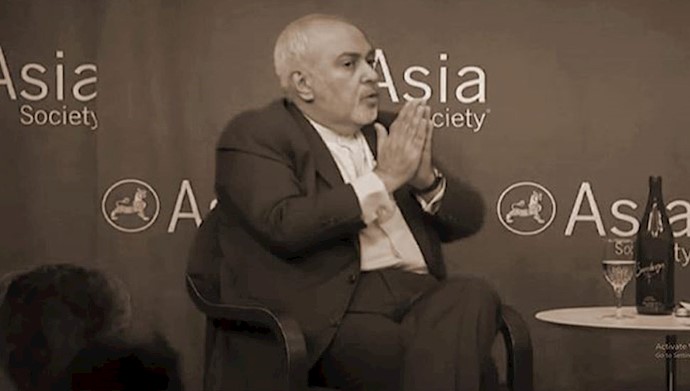Analysis by PMOI/MEK
Iran, May 7. 2019 – Iranian proponents of negotiating with the U.S. are once again on the offensive while Iranian Supreme Leader Ali Khamenei is doing his best to cover the widening rifts in his regime after two recent strategic blows. This includes crippling sanctions, with no waivers whatsoever, against the regime’s oil exports, being its single most important source of income, and the U.S. State Department designating the Islamic Revolutionary Guards Corps (IRGC) as a “Foreign Terrorist Organization” (FTO).
Despite the failure of the Iranian Foreign Minister Mohammad Javad Zarif in his recent visit to the U.S. to lure America into prolonged and fruitless talks, elements close to regime President Hassan Rouhani’s faction have already started a new campaign of lobbying in favor of negotiations.
The Baharnews website answers the question, “Why Zarif’s suggestion wasn’t taken seriously,” by implicitly acknowledging that in a dictatorship under Khamenei, no one in the world will take Zarif and the likes of him seriously.
“Raising such a suggestion without any sign of approval by those circles [i.e. circles close to and controlled by Khamenei where the real power rests] is more tantamount to a diplomatic act than a serious proposal,” the website writes.
A new talking point that proponents of talks with the U.S. are raising is that considering the crisis-riddled situation of the Islamic Republic, they should keep the door of negotiations open even if the U.S. is bullying Iran.
Jahan-e Sanat newspaper writes: “The parallel institutions [In the Iranian so-called moderate faction’s parlance, this means power centers close to the Supreme Leader] may have real arguments about negotiating with the U.S. Yet considering the increasingly gloomy nature of the Tehran-Washington relations and taking the situation Iran is facing, it isn’t right and one should not keep the door of negotiating with the U.S. closed.”
The newspaper then refers to the explosive state of the Iranian society because of economic misery and warns “the situation has reached alarming” levels and reiterates: “The path to escape the current situation goes through negotiations.”
Ali Bigdeli, a political pundit close to Rouhani’s faction, admits there are not many options left for Tehran. “Although pressures and sanctions have made the situation difficult, the door of diplomacy can always stay open,” he says.
On the other side, Khamenei’s faction is also actively promoting.
Ahmad Jannati, chairman of the Assembly of Experts and secretary of the Guardian Council, has strong remarks on this matter. “Some people want to say that some chants are expired, and we have to reconcile with the enemy. We should ask them whether they fear God or the U.S.? If they fear the U.S., then you are infidels.”
Regardless of the infinite infightings among the ruling elite in Tehran, Zarif’s proposal in New York to open a new round of dialogue under the pretext of prisoners exchange was not a decision that the Rouhani administration made overnight and its foreign minister announced suddenly.
Khamenei, as the final authority on all major policy matters, must have known and approved it. In fact, Rouhani and Zarif have not been the decision makers behind this maneuver and the current U.S. administration knows very well who makes major decisions in Iran.
We note @JZarif’s resignation. We’ll see if it sticks. Either way, he and @HassanRouhani are just front men for a corrupt religious mafia. We know @khamenei_ir makes all final decisions. Our policy is unchanged—the regime must behave like a normal country and respect its people.
— Secretary Pompeo (@SecPompeo) February 26, 2019
At the end of February, when Zarif suddenly resigned as the foreign minister, an act which didn’t last long, U.S. Secretary of State Mike Pompeo tweeted: “We note @JZarif’s resignation. We’ll see if it sticks. Either way, he and @HassanRouhani are just front men for the corrupt religious mafia. We know @khamenei_ir makes all final decisions. Our policy is unchanged—the regime must behave like a normal country and respect its people.”
The U.S. has shown the cold shoulder to Zarif’s proposal and reports about a variety of rank and files Iranian regime officials, including IRGC Quds Force Qasem Soleimani himself, trying to reassure their forces that war is not imminent. Therefore, it is clear that the recent diplomatic overture on the side of Iran was a move out of pure weakness under economic pressure and increasing domestic discontent aimed at stalling the inevitable.
On the one hand, the Iranian regime cannot accept Pompeo’s 12-point plan, knowing it will cut to the bone of its extremist ideology of expansionism.
And on the other hand, suffocating economic pressure and widespread domestic discontent threaten the whole power structure of the ruling regime.
So, as the ruling theocracy in Iran enters its final phase in history, it is interesting to watch how the ruling thugs in Tehran try to escape this inevitable dead-end.





